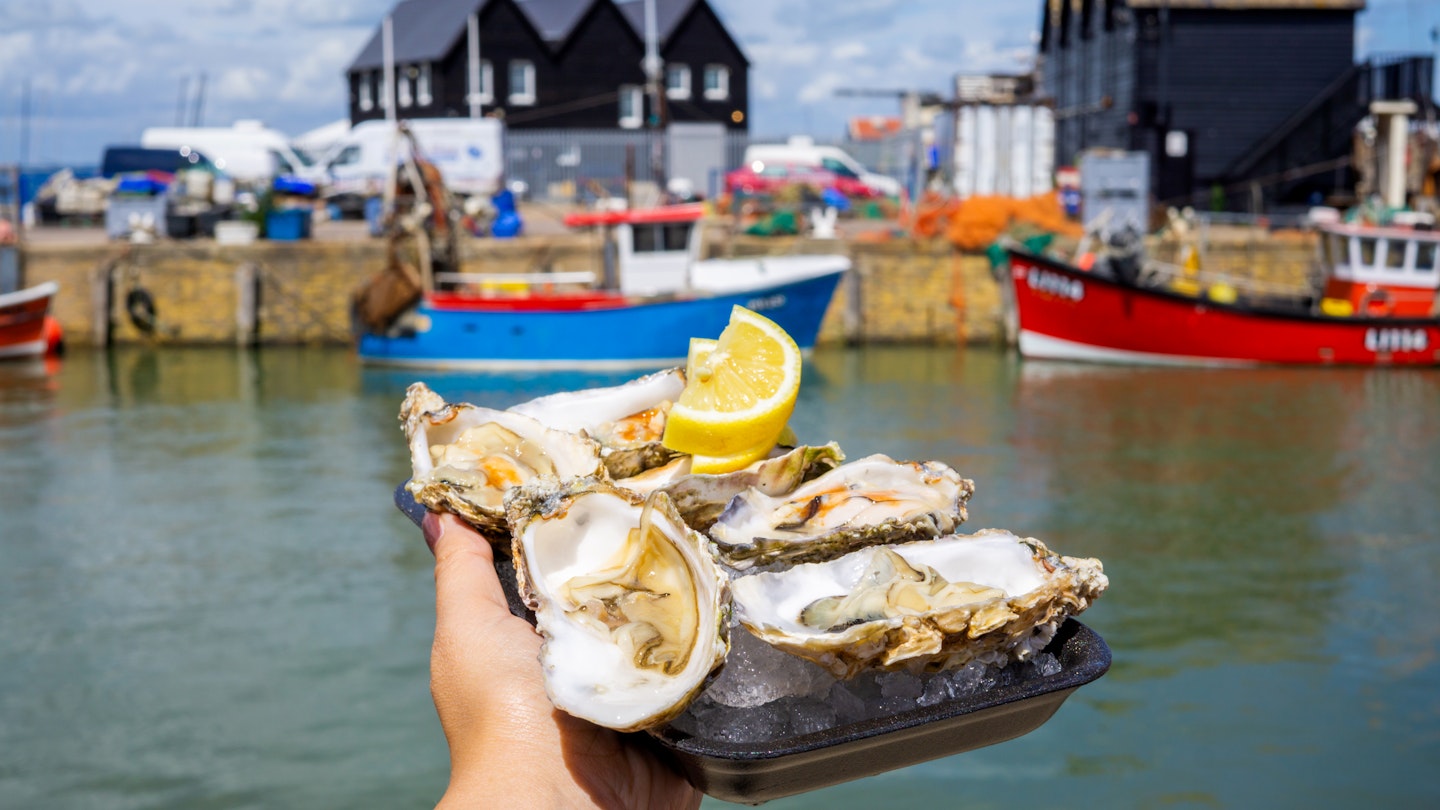Sarnies, toad in the hole, bangers and mash – traditional English cuisine can be as hearty as the lingo is bewildering. Once you’ve mastered the food slang, you’ll find that the dining (and drinking) offerings in England are vast, with plenty of regional specialties and individual quirks.
London is the gastronomic capital of England, offering upscale dining, world cuisine, indie venues mixed with chain restaurants and cafes, plus traditional “greasy spoons.” Beyond the capital, you’ll encounter unique dishes, menus featuring local produce, historic pubs, modern microbreweries, and distilleries in villages across the country.
1. Have a Traditional Sunday Roast in a Proper Pub
Feasting on a sizeable Sunday roast is a sacrosanct English experience and requires an ambitious appetite – especially when plated up by a doting grandmother. Expect large portions of roasted meat and gravy served with assorted vegetables, potatoes, and Yorkshire pudding – a savory side made from a simple batter.
Traditionally a beef-heavy meal, roasts were eaten after a Sunday church service when meat was considered a luxury. They have evolved over the years to include various meats and creative vegetarian and vegan options. A Sunday roast is essential pub fare, and everyone has their local favorite to recommend.
2. Enjoy Fish and Chips at the Seaside
Piping hot fish and chips at the seaside is a staple of British cuisine, best enjoyed after a bracing dip in the ocean. Even on blustery days, few can resist the lure of fryer-fresh chips on the promenade, devoured with a small wooden fork or grease-smeared fingers.
England’s national dish typically consists of crispy battered cod or haddock, served with deep-fried chips smothered in salt and malt vinegar. You’ll find this classic dish across England in “chippies” (fish and chips shops), cafes, and pubs. Even posh gastro pubs will have it on the menu.
3. Eat Bangers and Mash in a Dedicated Mash Shop
Bangers and mash are feel-good food and a popular pub dish in England. It’s a straightforward recipe: pork or beef sausages paired with creamy mashed potatoes and garden peas covered in gravy. The “bangers” half of the meal is a nod to cheap sausages in WWI that would burst open while cooking due to cheap fillers.
This humble dish has evolved, with gourmet sausages and plant-based options becoming a fixture on menus across pubs, cafes, and dedicated banger and mash shops.
4. Treat Yourself to a Fancy Cream Tea
Devon and Cornwall in Southwest England both claim to be the spiritual home of cream tea, with an ongoing friendly rivalry over its historical origin. Cream tea (not to be confused with afternoon tea) includes English breakfast tea and freshly baked scones slathered with clotted cream and fruity jam. Many southwestern cafes offer upmarket versions with the finest ornate china and artisan teas.
5. Feast on Cornish Pasties at England’s Most Southerly Point
Cornish pasties are a well-documented part of Cornwall’s culinary heritage, dating back to the 1200s. These D-shaped pastry parcels, with a wide crimped edge, are packed with a tasty mix of beef, potatoes, onion, and swede.
A cheap way to feed a family, they were the preferred portable lunch of Cornish tin miners in the 18th century. Today, you can enjoy traditional Cornish pasties in cafes and bakeries throughout England, with plant-based options becoming more widely available for vegetarians and vegans.
6. Sample Craft Beers at a Microbrewery or Local Pub
With more than 2000 independent breweries in the UK, it’s safe to say that the Brits enjoy an IPA or three. England’s craft beer scene has exploded, with indie brewers creating high-quality ales, IPAs, and bitters for a thirsty public.
Pub culture is catching up to consumer demand for locally produced pints, and many small-scale brews are now available on tap alongside mainstream lagers. A variety of tasting rooms, brewery tours, and masterclasses across England cater to beer aficionados eager to enhance their craft ale knowledge.
7. Vegetarians and Vegans, You Have Options
The rising popularity of veganism in the UK has led to an enormous increase in plant-based dining options across England. Restaurants and cafes are rapidly evolving to meet the growing demand for meat-free dishes, incorporating more creative plant-based options on their menus.
Major cities like Brighton, Oxford, and York now have a wide array of vegan-friendly establishments, while rural areas may pose more of a challenge in finding decent options. It’s advisable to research prior to your visit.
8. You Can Even Get a Vegan Version of “the Full English”
Synonymous with British culture, the traditional “Full English” traces back to the 13th century, serving as breakfast for the landed gentry. This morning dish includes bacon, eggs, sausages, beans, and toast, typically served with a cup of tea.
Vegan versions are becoming more popular, featuring scrambled tofu, faux-bacon, and spicy potato hash among the inventive options.
9. Go to a Foodie Festival
There’s no better way to immerse yourself in food culture than by attending a local food festival. Here are a few events to consider:
- Big Apple Harvestime – Sample local cider and perry at this harvest festival in Herefordshire each October.
- Isle of Man Food and Drink Festival – Experience Manx cooking and produce in September on the island in the Irish Sea.
- Yorkshire Dales Cheese Festival – Celebrate Yorkshire’s cheese with artisan cheesemakers every October.
- Porthleven Food Festival – A three-day April feast showcasing Cornish produce and flavors.
- Whitstable Oyster Festival – Celebrate summer with oysters in Whitstable, Kent.
- Beer on the Wye – Enjoy various ales at the riverside beer festival in Hereford every July.
Should I Tip at Restaurants and Bars in England?
In terms of tipping, a discretionary service charge is usually added to your bill. Though you could refuse to pay it, doing so would be unusual. If it’s not included, a tip of around 10 to 15% is customary for table service. However, you’re not expected to tip at the bar.





